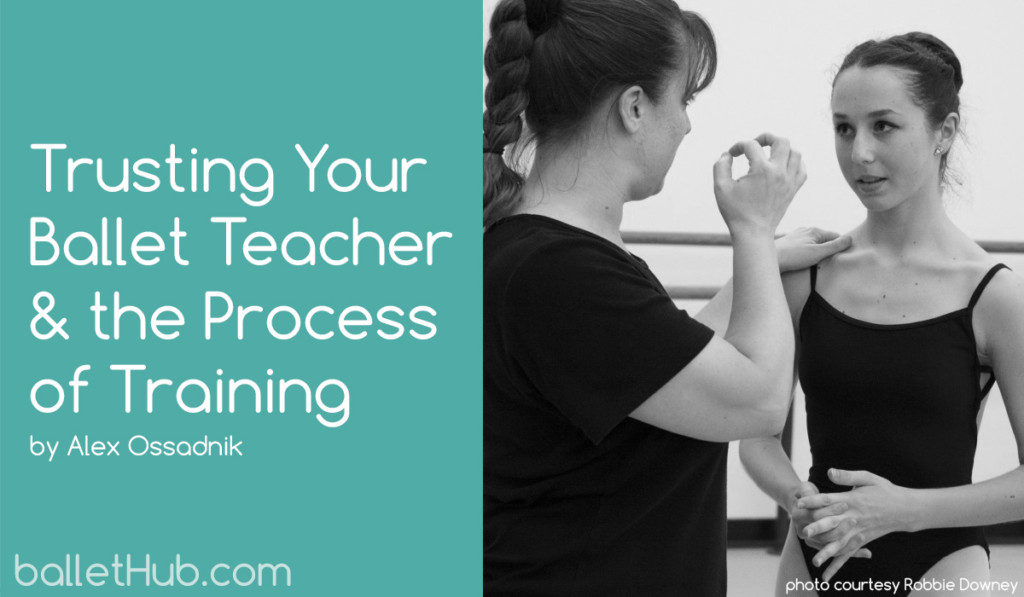Corrections you hear the most and like the least are the most important corrections for you. The reason is simple: How you feel doing things is a world apart from how things work and look in reality. That is why many dancers have a difficult time watching video footage of themselves. The only person that can give you realistic feedback, advice and corrections is the professional working with you. This may be a hard pill to swallow, but there is no way around it. Where is the fun in that?
Nothing happens overnight, nothing is instantaneous, because muscles that are usually not used have to be build over time.
Taking a ballet class means to have fun at failing! It means to have fun at falling down and getting up again. It means to have fun meeting a challenge and inching your way up the evolutionary ladder of progress one baby step at the time. Ballet training is a long process that only ends when you decide to stop dancing. There is no difference between a ten year old student working on a tendu and a seasoned principal dancer working on theirs. The fact of the matter is, every day is different, every day is like starting from scratch, every day the challenge is the same. Any good meal starts with growing or raising the ingredients, not with already eating it.
Ballet is an incredibly complex body of movement vocabulary that can only be mastered with discipline and unfailing consistency. There are no shortcuts, you cant just google pirouettes, everything you do can only be a result of your own work. That is what makes ballet such a great thing! I cant think of many other disciplines that are such great character builders and life coaches than ballet. Despite all the technological advances that steal already a large part of the purpose from our lives, ballet training is still only acquired like it has been since the seventeen hundreds.
With very few exceptions, teachers spend their lives coming up with ways to make this complex and complicated art form accessible to their students. In most cases, its not a job but a vocation. While ballet technique is fairly scientific, the teaching of ballet technique is often very personal and personality driven. Trusting your teacher is the basis for learning. If you don’t trust your teacher, you might as well not take the class. If you don’t trust your doctor, why bother? But its more complicated than that: Even trust takes work sometimes and it begins by trusting yourself, by having realistic expectations and before anything, being able to enjoy every moment just by itself and for it self.
Taking a ballet class means to have fun at failing! It means to have fun at falling down and getting up again.
Any ballet class is teamwork, you have to put in at least the same amount of energy, focus and attention as the teacher does. But before anything, patience is key. Nothing happens overnight, nothing is instantaneous, because muscles that are usually not used have to be build over time. When a body grows and proportions change, so does its relationship with the ballet vocabulary. Arms, legs and torso feel and function differently and have to relearn everything they knew before.
It is like building a house: first a foundation has to be excavated and then poured. It needs to dry after that, before you can think of putting the walls up, then there are windows, doors and the roof. Only after all that can you think about furniture and decorations.
Ballet training is a long process that only ends when you decide to stop dancing.
Furniture and decorations in ballet terms are all the fun things that will eventually be the result of everything that came before. The only person that can guide you through this process is the professional in front of the class and your willingness and tenacity to follow through without compromise. Otherwise it would be like having somebody build you a house who has no idea what they are doing.
Many combinations on the barre and in the center are like medicine. You have to respect the dosage and follow the instructions, and yes, sometimes it doesn’t taste too good.
The only time a teacher should not be trusted is when he or she promises overnight success, stardom, fame and fortune. Like with many things in life, when it sounds too good to be true, it probably is too good to be true.

